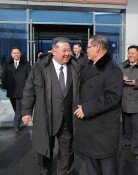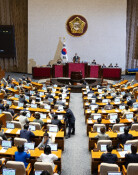[Editorial] Wise Educational Advice for the Govt
[Editorial] Wise Educational Advice for the Govt
Posted June. 27, 2009 08:23,
Sohn Byung-doo, who will retire this month as president of Sogang University and chairman of the Korean Council for University Education, has hit the nail on the head with his criticism of the governments education policy. In a newspaper interview, he blamed the government for resorting to regulation and control despite its promise of autonomy and competition in education. The comments by the entrepreneur-turned-university president comes at a time when the Lee Myung-bak administration is making a rapid shift in education policy.
Presidential Council for Future and Vision Chairman Kwak Seung-jun and ruling Grand National Party lawmaker Chung Doo-un yesterday announced proposals to curb private education at a forum hosted by the partys think tank. They suggested that high school academic records not be considered in university admissions from 2012 and also talked about the proposed ban on late-night lessons at private institutes. Their proposals are likely to be adopted given President Lees support for them.
The two ideas, however, run counter to autonomy in education and are expected to cause serious side effects. Not reflecting high school academic records into college admissions could prompt students to slack off in class and instead focus on preparing for university entrance exams. A ban on late-night classes at private institutes could promote tutoring on the black market. Koreas market for private education has always found loopholes in government crackdowns.
The government will introduce independent private high schools next year and a lottery system to select their students. Such a plan will make such schools only half independent. The government has also intervened in university admissions tasks that it handed over to the Korean Council for University Education. Despite President Lees election campaign pledge to encourage educational autonomy and competition, his administration is rapidly shifting to regulation and control.
Sohn said that while the government claimed to give autonomy to the council, it also demanded that the bans on university-administered entrance exams, the high school grading system, and the donation-for-admission system stay banned. On the governments strong recommendation that universities adopt the admissions officer system, Sohn said it is only one of many measures to diversity university admissions, stressing that a university should basically select its own students based on scholastic aptitude.
The latest educational policies announced by the government seem to be more oriented toward control and equalization than those under the previous administration. Government measures that aim only to reduce spending on private education could result in a bigger failure. The government should listen to Sohns comments that the cause of the disease must be cured by strengthening public education through evaluations of teachers and schools.







